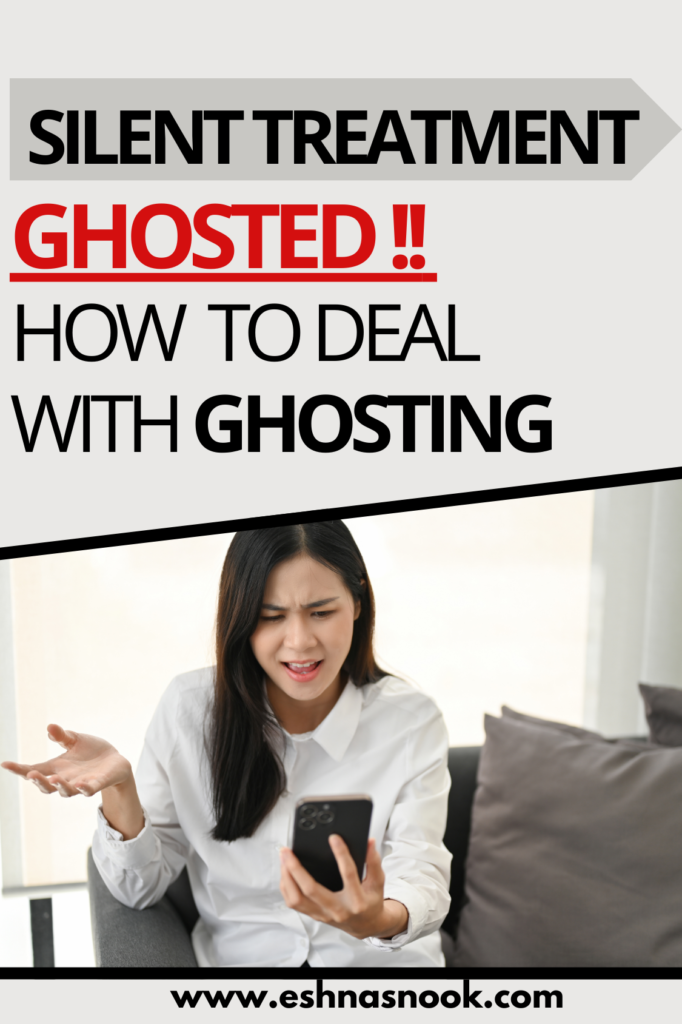Ghosting-The Silent Treatment
Why People Ghost and How to Deal with It
Ghosting, the act of suddenly stopping all communication with someone and leaving them hanging, is a behavior that has become increasingly common these days.
Ghosting is a type of silent treatment that mental health professionals consider emotional abuse if done intentionally. It makes you feel powerless and unable to express your feelings.
Without any explanation, your mind races with questions: Did they have an accident? Is their family okay? Are they just busy and will contact you soon?
As you can see, it’s called ghosting because it involves someone disappearing without a trace, much like a ghost.
Although it may seem like the easiest option at the time, ghosting causes confusion, hurt, and self-doubt.
Please do not forget to click here and follow me on Pinterest !!
The person being ghosted is left wondering what went wrong, questioning their own actions, and struggling with a lingering sense of rejection.
The silent treatment refers to the act of intentionally withdrawing from an interaction, refusing to engage further, and shutting the other person out.
When this happens, the person on the receiving end feels invisible, like they don’t matter.
Although there are many reasons someone might use the silent treatment, it often has negative consequences.

But what compels someone to resort to this tactic?
Why We Choose Silence Over Honesty
Breaking things off with someone, be it a romantic interest or a friend, is rarely easy.
Honest conversations about ending a connection can be awkward, emotionally charged, and exceedingly uncomfortable.
Ghosting offers a tempting escape route from this emotional discomfort.
The ghoster might anticipate that the other person might get upset with the news, or they might simply avoid and fear the idea of having a difficult conversation.
They might struggle with feelings of guilt or fear of hurting the other person, making silence seem like the kinder option (although the kindness is debatable).
This type of behavior reinforces the feeling that someone we care about wants nothing to do with us.
It can feel as though you don’t exist. No matter what you try to do, you cannot reach the other person.
People with weak communication skills often find expressing their feelings directly overwhelming.
Instead of handling a mature conversation, they choose the safety of silence.
RELATED POST: The Power of Emotional Intelligence in Relationships
Reasons why people might choose to ghost someone:
1. Avoiding Conflict
Sometimes people ghost because they want to avoid uncomfortable conversations.
Breaking off a relationship, whether romantic or just a friendship, can be really hard.
Ghosting lets them skip the awkwardness and potential arguments that might come with explaining their feelings.
2. Lack of Emotional Investment
In some cases, people just don’t feel a strong connection.
When the relationship isn’t deep, it’s easier for them to disappear without feeling the need to explain.
This often happens in relationships where the bond isn’t very strong.
3. Fear of Hurting Feelings
Ironically, some people ghost because they think it’s kinder than telling the truth.
They worry that being honest might hurt the other person’s feelings more than just disappearing.
They believe vanishing is a gentler option.
4. Overwhelm and Stress
Life can get really stressful with work, family issues, or personal problems.
People might feel overwhelmed and unable to handle more emotional stress.
Ghosting can be their way of escaping the pressures and responsibilities of a relationship.
5. Insecurity and Fear of Rejection
Insecure people might ghost because they’re afraid of being rejected.
They think that if they leave first, they can avoid rejection or criticism.
This way, they protect themselves from feeling vulnerable.

6. Convenience and Technology
With social media, ghosting has become easier.
Digital communication feels less personal than face-to-face talks, making it simpler to disconnect without facing immediate consequences.
The distance that technology provides can make people feel bolder about ghosting without much guilt.
7. Seeking Control
Ghosting can be a way for people to control the situation.
By deciding when and how to end communication, they keep the power and avoid feeling vulnerable.
This need for control often comes from past experiences where they felt powerless or hurt.
8. Emotional Immaturity
Some people ghost because they don’t have the emotional maturity to handle relationships.
They might lack the skills or experience to handle communication and conflict, so they choose the easiest way out.
9. Shifting Interests
In the fast-changing world of social connections, people’s interests can change quickly.
When someone’s interest fades, they might find it easier to ghost than to explain their changing feelings.
This is especially common where expectations around commitment and communication aren’t clearly defined.
How Ghosting Impacts the Ghosted
The consequences of ghosting extend far beyond the ghoster’s temporary relief.
The person on the receiving end is left feeling confused, hurt, and often questioning their own self-worth.
The lack of closure can be particularly damaging.
Without a clear explanation for the sudden silence, the ghosted person is left to fill in the blanks themselves.
They might ruminate on the situation, replaying past interactions, and searching for reasons why they were abandoned.
This can lead to a decline in self-esteem and a sense of powerlessness. The ghosted person might start questioning their judgment or attractiveness, wondering what they did wrong to deserve such treatment.
The emotional impact of ghosting can also make it difficult to trust others and form healthy connections in the future.

Coping with Being Ghosted and Healing from Ghosting
Healing from the emotional sting of being ghosted takes time and self-compassion.
Being ghosted can be a painful and confusing experience.
Here are some strategies to cope with being ghosted:
Don’t personalize It:
Remember, ghosting is more about the ghoster’s limitations than any shortcomings on your part.
The vast majority of the time, it has nothing to do with you.
Limit Contact:
Once you realize you’ve been ghosted, resist the urge to reach out repeatedly.
This will only give the ghoster more power and prolong your own hurt.
Focus on Self-Care:
Prioritize activities that nourish you emotionally and remind you of your worth.
Spend time with supportive friends and family, engage in hobbies you enjoy, and practice self-compassion.
Seek Support:
Talking to a trusted friend, therapist, or counselor can help you process your emotions and move forward in a healthy way.
Challenge Negative Self-Talk:
After being ghosted, it’s easy to fall into a cycle of negative self-talk.
Counter these thoughts with affirmations that remind you of your worth.
Forgive Yourself and the Ghoster:
Holding onto anger and resentment will only hinder your healing.
Forgive yourself for hoping for a different outcome and forgive the ghoster for their lack of communication.
Focus on the Positive:
This experience doesn’t define you. Reflect on the positive aspects of your life and the qualities that make you a great friend or partner.
Learn and Grow:
Use this experience as a learning opportunity. Maybe it highlights the importance of setting clearer boundaries in future relationships.
Embrace New Beginnings:
Don’t let ghosting discourage you . There are plenty of people who value honest communication and healthy relationships.
Acknowledge Your Feelings
It’s normal to feel hurt, confused, and even angry. Allow yourself to process these emotions rather than suppressing them.
Avoid Self-Blame
Remember that being ghosted is more about the other person’s inability to communicate effectively than it is about your worth. Don’t internalize their actions as a reflection of your value.
Seek Closure on Your Own
If you can’t get closure from the other person, find ways to create it for yourself. Write down your thoughts, talk to friends, or engage in activities that make you feel positive and empowered.

Ghosting in Friendships
You know that feeling when you’re texting back and forth with your friend and then suddenly, out of nowhere, they go MIA?
Yes, that’s what we call ghosting in friendships, and yes– it can really mess things up.
But why exactly does it lead to misunderstandings?
1. Silence Kills Communication:
Imagine your friend just goes silent.
No explanation, nada.
It’s like trying to solve a puzzle with missing pieces.
Without communication, misunderstandings are bound to happen.
RELATED POST: Strengthening Friendships through Communication
2. Everyone’s a Mind Reader ?
So, your friend vanishes into thin air, leaving you thinking and wondering what went wrong.
Did you say something to upset them?
Did they misinterpret your last message?
Without clear communication, it’s easy to jump to conclusions and make assumptions – and you know what they say about assumptions.
3. Rejection Hurts
Getting ghosted feels like being stood up on a date – it hurts and stings.
It’s like your friend suddenly decided you aren’t as good as they had hoped and decided to dump you without a second thought.
The silence can leave you feeling rejected and questioning your worth.
“Am I not good enough? Did I do something to push them away?”
It’s a blow to the ego, no doubt.
4. Trust Takes a Hit
Trust is like a delicate flower – it needs care and attention to bloom.
When your friend ghosts you, it’s like stepping on that flower. Ouch.
It chips away at the trust and intimacy in the friendship, making it hard to bounce back.
You start to wonder, “Can I really count on them to be there for me when I need them?”
5. Missed Opportunities for Fixing Things
Without talking things out, there’s no chance to fix any issues or misunderstandings.
Once it’s gone, it’s gone.
Maybe there was a simple misunderstanding that could have been cleared up with a five-minute conversation.
But without that chance, the distance in the friendship grows wider.
Ghosting and silence in friendships?
Not cool.
If you’re feeling the urge to ghost, just hit pause and have an honest conversation instead.
Trust me, your friend will thank you for it.
Remember, you deserve to be treated with respect and kindness in all your connections.
Please don’t forget to PIN this post




Ghosting is one of my biggest pet peeves. While I’m not perfect, I always make the best effort I can to close a relationship whether it be business or personal. It’s the right thing to do. Thanks for sharing these great tips on how to deal with ghosting.
Thanks for reading..!
Ghosting is a common problem in many industries, especially with HR and recruiting… your explanation shows that many in this industry seem to be quite immature/lazy.
Agree.. ghosting in HR is prevalent and definitely its immaturity on their part. Thanks for reading my post.
Technology has made ghosting such a problem. It is a cruel way to treat someone.